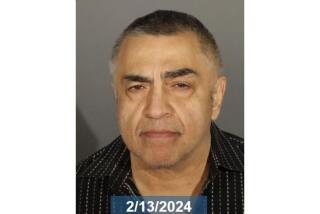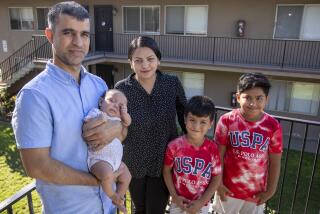Car bomb suspect struggled to find a place
- Share via
Reporting from Bridgeport, Conn., and Washington — For most of the past decade, Pakistani immigrant Faisal Shahzad struggled to find his place in America, piling up debts and bouncing from one run-down neighborhood to another.
In 2004, he and his wife, Huma Mian, plunked down savings to take out a $218,400 mortgage for a two-story house in Shelton, a gritty Bridgeport suburb. The following year, Shahzad was awarded a master’s of business administration degree from the University of Bridgeport, normally a ticket to a prosperous future
But unable to pay the mortgage or a $65,000 home equity loan, the couple abandoned their home to foreclosure last summer, putting broken furniture and old clothes up for sale. A heating oil company chased them for non-payment of bills.
The portrait of failure that emerged Tuesday sheds new light on the 31-year-old former financial analyst — reportedly the son of a senior Pakistani Air Force officer — who U.S. officials say has admitted parking a 1993 Nissan Pathfinder packed with fireworks, gasoline and propane on one of New York’s busiest streets Saturday. The car bomb failed to explode.
As the investigation intensified, neighbors and teachers described Shahzad as a loner who seemingly made few friends and little impression, until now.
Shazad was raised in Karachi, Pakistan’s largest city, and grew up in the North Nazimabad neighborhood, an upper-middle-class district of mostly Urdu-speaking, well-educated Pakistanis. Some family members still live there, officials said.
Shahzad came to America in 1998 on a student visa and studied business for five semesters at Southeastern University in downtown Washington, D.C. The college lost its accreditation last year and closed, but records found in the trash outside Shahzad’s home by a Connecticut Post reporter and posted online Tuesday indicate he was a poor student, getting mostly Cs and Ds, and an F.
Shahzad managed to transfer to the University of Bridgeport in the late 1990s, and was awarded a bachelor of science degree in fall 2000, with a major in computer applications and information systems, according to spokeswoman Leslie Geary.
“He never did anything to stand out,” recalled William Greenspan, who was Shahzad’s academic advisor. “He was an average student. He never expressed any concerns to me.”
Tax returns found in the trash Tuesday show Shahzad’s income in 2000, when he earned his undergraduate degree, was $5,458. His 2001 return lists his occupation as an account analyst, and a gross income of $22,650.
He mostly worked for Accountants International, a temporary employment agency based in Burlingame, Calif. He normally clocked four days a week at Elizabeth Arden, the cosmetics and spa giant, in Stamford.
Shahzad soon returned to the University of Bridgeport, and in the summer of 2005, he was awarded the master’s in business administration degree.
Records show Shahzad and his wife moved repeatedly during his student days, renting apartments in Bridgeport and the other Connecticut towns of Milford and Norwalk. Neighbors said they spoke little English, and usually kept to themselves.
In 2004, the couple bought a two-story, three-bedroom house with an attached garage on Long Hill Avenue in Shelton, northwest of Bridgeport. Neighbors recall him working late at night, and then taking long walks in the flowing pants and shirts common in Pakistan.
“He was always in white and wearing those funny sandals,” said Debbie Bussolar, a dental technician who lived across the street. He wore a bushy beard for a while, she recalled, but trimmed it short.
Shahzad had landed a slot as a junior financial analyst in the Norwalk office of the Affinion Group, a marketing and consulting business, the company said. And his life seemed to improve.
In February 2009, he obtained a $65,000 home equity loan from Wachovia Bank. And on April 17, 2009, he became a U.S. citizen in a ceremony before a federal magistrate at the U.S. courthouse in Bridgeport.
But two months later, in June 2009, he quit the job he had held for three years. That month, he, his wife, and their children — a girl about 4 and a boy about 1 — walked away from their home in Shelton.
Milford Superior Court records show Chase Home Finance LLC sued Shahzad last September to foreclose on the house. Wachovia sued for default on the loan. And Hoffman Fuel sued him for $793 in delinquent bills.
The family moved to a rougher neighborhood of wood, multifamily houses in east Bridgeport, a long-depressed urban area. It was a clear step down.
“There are a lot of transients in the neighborhood,” said Mike Grobe, a local real estate investor.
Today, the two-story house Shahzad once owned in Shelton is empty and an eyesore, with uncut grass and garbage strewn on the lawn. A padlock hangs on the door.
More to Read
Sign up for Essential California
The most important California stories and recommendations in your inbox every morning.
You may occasionally receive promotional content from the Los Angeles Times.











